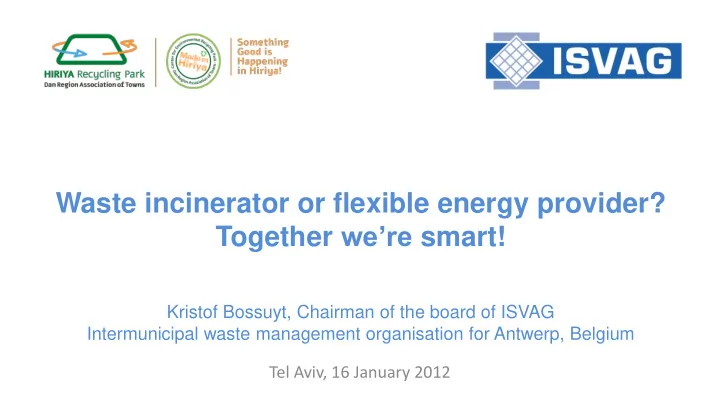

Waste incinerator or flexible energy provider? Together we’re smart! Kristof Bossuyt, Chairman of the board of ISVAG Intermunicipal waste management organisation for Antwerp, Belgium Tel Aviv, 16 January 2012
• Founded in 1975 • Non-recyclable residual waste • >1 mio citizens • 140 KT + 40 KT • Operational since 1980 • Permit until 2025 • Electricity for >25.000 households
FLANDERS • 70% sorted • 29% waste-to-energy • <1% landfill
Does waste-to-energy threaten or substitute recycling? No!
Minimizing waste in everyday life is necessary! But … Zero Waste = Utopia
Even in a circular economy, we need a sink to remove non- recyclable materials. Waste-to-energy keeps the urban metabolism healthy by removing polluted substances.
In the coming decades, the global and Antwerp population will continue to grow. At the same time, we have ambitious objectives to further reduce the amount of residual waste per inhabitant.
Non-recyclable household waste is a very specific and heterogeneous substance.
Science is evolving. New techniques are being developed for specific waste streams.
Extensive research confirmed that a state-of- the-art waste-to-energy plant is the only available proven technology which is robust enough to treat residual waste today (BAT).
Difference? 1. Catalytic DeNox 2. Power + district heating 3. Extremely low emissions
180.000 tons residual waste MAGNET REMOVES = SCRAP METAL OUT OF THE BOTTOM ASH 4.000 tons of new metal
Bottom ash recycled into pavement tiles and asphalt
District heating (or cooling) • Crucial in decision location • Step-by-step • First stage: 1,6 km to nearby companies (3MW) • Second stage: 12 km to city (>50MW) + include other sources
Evolving energy landscape • Security of supply • From base-load to flexible peak-load • Communicating vessels: electricity, district heating, hydrogen
WHY? Heating of houses in Flanders is predominantly fossil. District heating has enormous potential in terms of avoided emissions. A city-wide district heating network is a crucial asset for Antwerp in achieving its climate targets.
NEED FOR 1. SCIENTIFIC ACCEPTANCE 2. POLITICAL ACCEPTANCE 3. PUBLIC ACCEPTANCE
• CO-OPERATION WITH LOCAL UNIVERSITIES • INTERNATIONAL CONSULTANTS • INTERNATIONAL EXTERNAL SCIENTIFIC ADVISORY BOARD
• INDIVIDUAL MEETINGS • DIALOGUE • TRANSPARANCY
• VISITOR CENTER • INFOMEETINGS • MEDIARELATIONS • 1 HOUR RESPONSE
TRANSLATION • Scientists with an impeccable reputation provide studies • Translated into comprehensible language, not milligrams or nanograms, but intelligible terms
citizens Families FINE DUST EMISSIONS
To wrap up …
No rocket science
Not magic
Questions? ISVAG Boomsesteenweg 1000 2610 Wilrijk www.isvag.be - tel. +32 3 877 28 55 – info@isvag.be
Recommend
More recommend